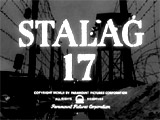
|
Stalag 17 (1953)
In writer/director Billy Wilder's entertaining black
comedy and dramatic war film - the film was based on an original
Broadway play with a script co-written by Edward
Trzcinski - who was an actual German captive in a POW camp (Stalag
17B in Austria) during WWII; the film screenplay was co-scripted
by Wilder and Edwin Blum - chronicling the imprisonment of Americans
in a German POW camp: [Note: The popular CBS-TV show Hogan's
Heroes (1965-1971) was also set in a German Stalag POW facility.]
- after the opening title credits (to the tune of
"When Johnny Comes Marching Home"), the night setting
was a large German POW camp known as Stalag
17 "somewhere on the Danube" in late December 1944 during WWII; there were
about 40,000 POWs there, including a group of
captured US Sergeants (630 US airmen) who were imprisoned
in Compound D
- one of the characters serving as the narrator,
Clarence Harvey "Cookie" Cook (Gil Stratton, Jr.) began
with an introductory flashback to provide the story: "I don't
know about you, but it always make me sore when I see those war
pictures -- all about flying leather-necks and submarine patrols
and frogmen and guerillas in the Philippines. What gets me is that
there never was a movie about POWs -- about prisoners of war. Now
my name is Clarence Harvey Cook -- they call me Cookie. I was shot
down over Magdeburg, Germany back in '43. That's why I stammer
a little once in a while, especially when I get excited. I spent
two and a half years in Stalag 17. Stalag is the German word for
prison camp and number 17 was somewhere on the Danube. There were
about forty thousand POWs there, if you bothered
to count the Russians, the Poles and the Czechs. In our compound,
there were about six hundred and thirty of us -- all American
airmen --- radio operators, gunners and engineers -- all Sergeants.
Now you put six hundred and thirty sergeants together and, oh mother
-- you've got yourself a situation! There was more fireworks shooting
off around that joint! Take for instance the story about the spy
we had in our barracks. It was about a week before Christmas in
'44 and two of our guys -- Manfredi and Johnson to be exact --
were just getting set to blow the joint..."
- there were views of machine-gun carrying German
guards with vicious guard dogs patrolled the area, marked by searchlights,
high fences, gates, and barbed wire; primitive one-story wooden
structures held the prisoners
- inside the crowded Barracks # 4, triple-level bunk
beds lined the interior where 75 men were cooped up; everyone helped
to coordinate the attempted escape of two US airmen: Manfredi (Michael
Moore) and Johnson (Peter Baldwin), who were being supported by Barracks
Chief "Hoffy" Hoffman (Richard Erdman), and Security Chief
Frank Price (Peter Graves); cynical wise-guy Sergeant J.J.
Sefton (Best Actor-winning William Holden) watched from the side;
the two escapees were supplied with civilian clothes, a compass,
faked papers (as French laborers), a map, and money, and were briefed
with detailed instructions on their route to their ultimate destination
- Switzerland; Sefton briefly commented:
"Just one question. Did you calculate the risk?"
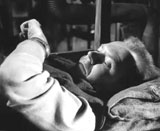
Barracks Chief "Hoffy" Hoffman (Richard
Erdman)
|
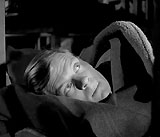
Security Chief Frank Price (Peter Graves)
|
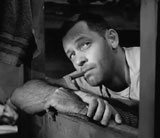
Sgt. Sefton (William Holden) Watching the Doomed Escape Attempt
|
- Manfredi and Johnson descended under the barracks
building through a trap door located under the heavy iron stove,
and then crawled and scampered across the compound's grounds to
a tunnel under the wash latrine that led out of the camp to a forest;
once they reached the Danube, they were planning to take various
forms of transport (a barge and a train) out of Germany to Switzerland
- and freedom; as the others wished for their success, the enterprising
Sefton callously forecast: "I bet they don't even get out
of the forest"
- and even dared to wager about their success or failure: "Two
packs of cigarettes say they don't get out of the forest"
- as Sefton had
predicted, Manfredi and Johnson were mowed down by three German
soldiers (manning a machine-gun) waiting for them as they emerged
from the tunnel in the pine forest about 30 feet outside the
barbed wire; inside the barracks after hearing the dreaded gunfire,
one of the prisoners Sgt. Stanislas "Animal" Kuzawa
(or Stosh) (Robert Strauss) voiced what everyone was thinking:
"Maybe the Krauts knew about that tunnel all the time!" -
and Sefton was suspected to be the most-likely Nazi informant
- the next morning, "Cookie" introduced
the new scene: "Every morning -- at six on the dot -- they'd have the Appell
-- that's roll call to you..."; the inhabitants of the barracks
were awakened by their "alarm clock" - buffoonish NCO supervisor Sgt. Johann
Sebastian Schulz (Sig Ruman)
- during a line-up in the cold, stark weather, the
prisoners noticed the corpses of Manfredi and Johnson lying in
the mud under a blanket; the main German Kommandant
was introduced: sadistic and smug warden Oberst Von Schernbach (Otto
Preminger); he addressed the POWs with a warning about challenging
his escape-free record: "I understand we are minus two men this
morning...Fortunately those two men did not get very far. They had
the good sense to rejoin us again, so my record would stand unblemished.
Nobody has ever escaped from Stalag 17. Not alive, anyway"; he
reminded them that anyone outside the barracks after lights out would
be shot on sight; also, the iron stove hiding the trap door would be
removed, and the escape tunnel would be filled in
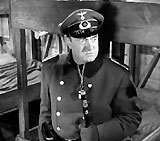
Sgt. Johann Sebastian Schulz (Sig Ruman)
|
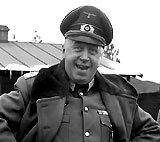
Kommandant Oberst von Schernbach (Director Otto
Preminger)
|
- later while washing up in the latrine, Duke (Neville
Brand) speculated with his co-patriots about how the Germans knew
their escape plans: "I just want to know what makes those
Krauts so smart....maybe there's somebody in our barracks
tipping 'em off like one of us!...one of us is a stoolie
- a dirty, stinkin' stoolie!"
- Sefton encouraged suspicion by deliberately tormenting
the others - he fried up a fresh egg in a skillet on the iron
stove, accompanied with a cup of instant coffee with sugar - food
luxuries that he had acquired by recently trading 45 cigarettes
with the Germans (the ones he had won betting on the escape attempt);
Duke inquired with an accusatory insinuation: "What'd ya give the
Krauts for that egg?"; Sefton explained how he had profited by
becoming an entrepreneur, but that didn't make him a traitor: "What's
your beef, boys? So I'm tradin'. Everybody here is tradin'. Only
maybe I trade a little sharper. So that makes me a collaborator?...This
ain't no Salvation Army -- this is everybody for himself. Dog eat
dog"
- resourceful black marketeer Sefton delivered a precise
explanation of his motivations to try to remain as smart and 'comfortable'
as possible during his imprisonment, and not foolishly try to
escape: "Whaddya think the chances are of gettin' outta here?
Well, let's say you make it to Switzerland! Let's say to the States?
So what? They ship you out to the Pacific, slap you in another
plane, and you get shot down again, only this time you wind up
in a Japanese prison camp. That's if you're lucky! Well, I'm no
escape artist!...You can be the heroes, the guys with fruit salad
on your chest. Me -- I'm stayin' put. And I'm gonna make myself
as comfortable as I can. And if it takes a little tradin' with
the enemy to get me some food or a better mattress -- that's OK
by Sefton!"
- the comical Marko the Mailman (William Pierson),
the Inter-barracks Communications Officer, brought in a smuggled
contraband radio (a makeshift set with tubes) to listen to distressing
news of the war from the BBC; the men created an antenna wire for
the radio and attached it to an outdoor volleyball net through
a window; the news was not promising as Sefton asked: "Looks like
it's gonna be a longer war than you figured, eh Duke?"
- the unexpected arrival of Schulz interrupted the
news broadcast; Duke confronted Schulz and asked him about
a possible informant in their midst: ("We're on to you. You
know everything that's happening in this barracks. Who's tipping
you off?...Come on, Schulz! Spill it! How'd you get the information?
About Manfredi and Johnson? About the stove and the tunnel? All
right, Schulz! Who's giving it to you? Which one of us is it?");
Schulz reacted with surprise: "Tipping me off? I do not understand";
Sefton jokingly volunteered: "Why don't you just tell 'em
it's me. Because I'm really the illegitimate son of Hitler"
- later, once he was left alone in the barracks, Schulz
observed a loop in the electrical cord of a
naked hanging lightbulb suspended above the barracks' chessboard;
he realized that it was a signal from the informant that there
was a note; he secretly saw that there was a hidden
message inside the hollow black queen chesspiece on a chessboard;
he pocketed the piece with the message, and placed an empty black
queen piece back on the board, and then straightened the cord
to signify that he had taken the note
- Sefton's assistant "Cookie" provided further narration
about the informant: "Somebody in our outfit was tipping off the
Krauts, sure enough, only who was it? The 'Animal', or Harry, or
Hoffy, Price, Blondie, Goofey Joey, or Duke? It sure wasn't
me. Maybe it was Sefton"
- Sefton's profitable enterprises as a "Big Time Operator"
included the organization
of weekend 'horse'-races with rats (cigarettes were gambling currency),
the creation of an alcohol-brewing distillery (a Rube Goldberg
apparatus), and an Observatory that involved the rental of a 7
foot-long telescope on a tripod to spy on female Russian prisoners
in a neighboring compound being deloused (although steamy windows
obscured the view)
|
Sefton's "Big Time Operator" Enterprises
|
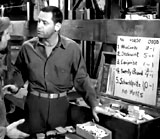
Sefton's Mice-Race Gambling Enterprise
|
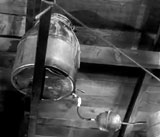
Makeshift Distillery
|
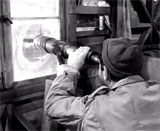
Telescope to Spy on Female Russian Prisoners
|
- Barracks Chief "Hoffy" became critical
of Sefton for his crass exploitation of the others with various
forms of entertainment; both "Hoffy" and Duke even insinuated
that he was the informant; Sefton explained how he got away with
so much: "I grease the Kraut guards. I give 'em ten percent of
the take"
- a few days before Christmas, captured Lieutenant
Dunbar (Don Taylor) and Sgt. Bagradian (Jay Lawrence) were temporarily
assigned to Barracks 4, while Dunbar was awaiting transfer to
the officers' camp; Sefton expressed his
scornful prejudice toward Dunbar who he believed had received
special admittance into Officer's Training School due to his wealthy
Boston upbringing
- it was unwisely revealed to the entire barracks
by Bagradian (using a James Cagney accent) that Dunbar had blown
up a German ammunition supply train (with 26 cars) by rigging a
time bomb in the Frankfurt train station's restroom;
shortly later, a message about Dunbar's destructive train-bombing
act was transferred by the informant to Schulz through a message
placed inside the black queen chess-piece, signaled by another
looped cord
- two more incidents caused
more suspicion to be directed toward Sefton - (1) many
thought he had been rewarded for revealing the presence of the
radio and antenna (that were confiscated), since his footlockers
that were broken into were filled with food, wine bottles, binoculars,
a cuckoo clock, wristwatches, and more; (2) Sefton had briefly
disappeared - he had reportedly bribed the guards to allow personal time with the Russian females ("Now
we know what he got for the radio"); when accused of being a "stoolie"
- he barked back: "What is this anyway? A Kangaroo Court?"
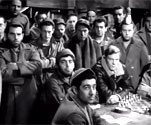
|
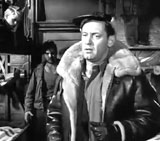
|
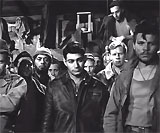
|
|
Suspicions Grew About Sefton Being the Camp's Stoolie
|
- later, Sefton was accused
of leaking information about Dunbar's successful sabotage, that
led to the Lieutenant's arrest and brutal interrogation and merciless
beating by von Schernbach; Sefton thought to himself: ("I
suppose some jerk's gonna say I did it"); when falsely accused
of being guilty for squealing, Sefton was beaten by his own barracks-mates
in his bunk; with a bruised face, Sefton became determined to
find out the identity of the spy - with or without Schulz's help:
(he questioned Schulz: "Who is the guy?...The one you work
with. Who is he? How do you do it?")
- during the visit of a "Geneva Man" (Erwin Kalser)
for a required Geneva Convention inspection, he questioned Dunbar's
incarceration and treatment (for being an unproven saboteur) and
threatened prosecution through a War Crimes Commission trial following
the war
- to discover further evidence about Dunbar's alleged
act of sabotage, during distractions of Christmas
celebrations in the barracks (while the men were marching
and singing "When Johnny Comes Marching Home"), Price
picked up the hollow black Queen to retrieve a hidden message
from Schulz and then stealthily replaced the chesspiece with an
empty one; to signal that he had received the message,
he pulled down on the looped cord to straighten it
- at the same time while recuperating in his bunk,
Sefton suspiciously noticed his first clue about the spy's method
of communication - the shadow of the swinging lightbulb cord
- afterwards, Price casually questioned Sgt.
Bagradian about the details of how Dunbar had devised a time bomb
"with the old match gag" to blow up the train; Dunbar had tossed
his primitive delayed bomb-fuse (a burning cigarette attached
to a match book) into an open train car with straw on the floor
as the supply train was pulling out
- during a Christmas Eve party in the barracks, Sefton
now noticed that the lighbulb cord was looped; it was Price's
signal that he had a message for Schultz; an
air raid caused an emergency evacuation (except for Sefton who
remained behind in the shadows)
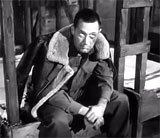
|
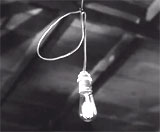
|
|
Sefton Noticed a Change in the Bulb's Cord - It
Was Now Looped (A Signal that a Message was Ready)
|
- from his hiding
place, Sefton watched as Price conversed in German with Schulz
and demonstrated what he had learned
- the details of Dunbar's time bomb (cigarette and match-book
device); self-satisfied that he had finally learned the identity
of the spy, Sefton lit a cigar; the next day (Christmas Day),
Sefton coyly revealed his suspicions about the stoolie to his
assistant Cookie: "Maybe that stoolie's not an American at all.
Maybe he's a German the Krauts planted in this barracks...Just
one of the boys. Sharing our bunks. Eating our chow. Right in
amongst the ones that beat me up"
- Hoffy planned an escape
attempt to rescue Dunbar from two SS officers who were preparing
to drive him to Berlin; commotion was created with smoke bombs
and a riot; the SS officers were jumped and Dunbar was seized
and taken to the latrine's water tower to hide there until nighttime;
he had to stand up to his knees in icy water while awaiting his
escape
- when asking for volunteers to help Dunbar get
out of the camp, Price eagerly volunteered ("I'll take
him out"); Sefton
cautioned everyone that the informant now knew where Dunbar
was hiding: ("The Germans know where Dunbar is...You told
them, Hoffy"); it was the perfect opportunity for Sefton
to expose Price in their midst as a German-born spy: ("You're
kaput, Price!...He's a Nazi, Price is....He spoke our lingo
so they sent him to spy school, and fixed him up with phony dogtags")
- Sefton snatched the black queen ("the mail
box")
from Price's pocket, and then demonstrated the signal-message
system to everyone: ("They did it by mail. That's right.
Little love notes between our Security Officer and von Scherbach
with Schulz, the mail man. Here's the flag. He used to put
a loop in the cord. (He created a loop in the light cord) Did
you ever notice? And here's the mail box - hollow black queen.
(He picked up the chess piece and opened it) Cute, huh? They
delivered the mail or picked it up when we were out of the barracks");
Price was angrily restrained
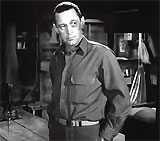
Sefton: "The Germans know where Dunbar is"
|
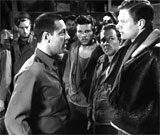
Sefton: "You're kaput, Price!"
|
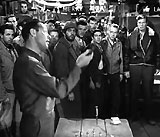
Sefton Demonstrating the "Mail" System
|
- Sefton decided to help Dunbar escape (he was hoping
for a rich reward from Dunbar's wealthy family: "There oughta
be some reward money from Mama. Say about ten thousand bucks worth"),
while Price as a "decoy" (who had been rigged with clattering
tin cans) was shot down in the middle of the compound by guards;
the chaos allowed Sefton to crawl to Lt. Dunbar before escorting
him out of the camp through the outer barbed wire fence to safety
- as the film concluded, Schulz and von Scherbach
were stunned and shocked to see Price's dead body in the mud; the
men inside the barracks pretended as if nothing had happened,
as Cookie began to whistle: "When
Johnny Comes Marching Home"
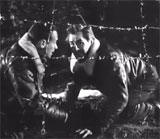
Sefton's and Lt. Dunbar's Successful Escape From the Camp
|
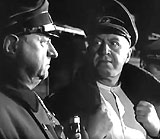
Stunned Shock on the Faces of Schulz and von Scherbach
|
|
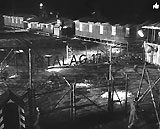
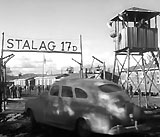
Main Entrance to Stalag 17
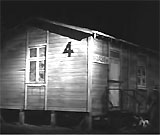
Barracks 4 in Stalag 17
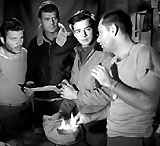
During Escape Plans, Sefton's Question: "Did you calculate the
risk?"
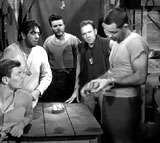
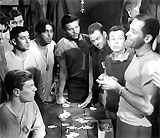
Sefton: "Two packs of cigarettes say they don't get out of the
forest"
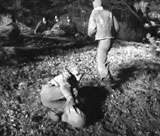
Manfredi and Johnson Mowed Down as They Emerged from Tunnel into
the Surrounding Forest
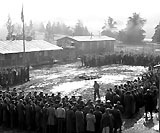
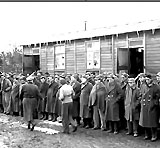
The Early Morning Roll-Call and Line-Up
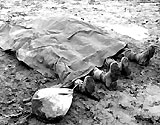
The Corpses of Manfredi and Johnson
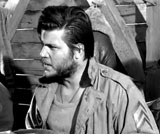
Duke: "I just want to know what makes those Krauts so smart...one
of us is a stoolie"
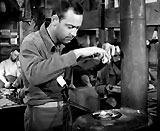
Sefton Frying Up a Fresh Egg - Prompting Suspicion
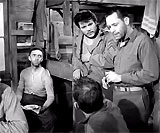
Sefton's Speech to Other POWs About Remaining Smart and 'Comfortable'
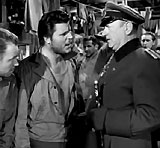
Schulz Asked by Duke About The Identity of His Informant in the Barracks
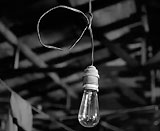
The Signal For the Presence of a Hidden Message
(a Looped Light Bulb Cord) From the Informant
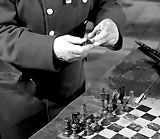
Schulz Retrieving the Message Hidden in a Chess Piece
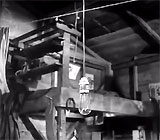
Later, the Cord Had Been Straightened
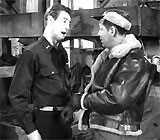
Lt. Dunbar and Sefton at Odds With Each Other
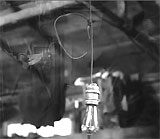
Signal: The Light Cord Was Looped Again After Information was Divulged
About Dunbar's Bombing of German Supply Train
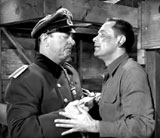
Sefton Demanding to Know the Identity of Schulz' Informant
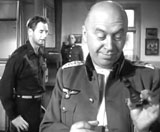
Von Schernbach's Interrogation of Lt. Dunbar Regarding Train Sabotage
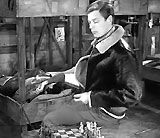
Price Retrieving a Hidden Message in the Chesspiece
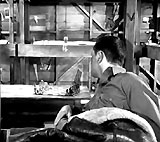
Sefton Noticing the Swinging Unlooped Lightbulb Cord
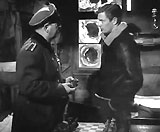
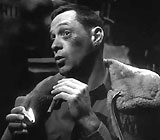
Sefton Learning the Informant's Identity: Price (Speaking German to
Schulz)
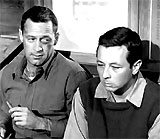
Sefton with His Assistant Cookie (the film's narrator)
|



























